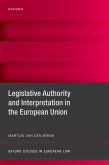Many Europeans struggle to understand where EU-centred Europeanization has led them. The standard response - that their situation is sui generis, one of a kind - no longer holds. Brexit, conflicts over European financial transfers, immigration, or dubious judicial reforms in some Member States demand a more substantial answer. Against that background, The Emergence of European Society Through Public Law: A Hegelian and Anti-Schmittian Approach frames European integration by reconstructing European public law in light of Article 2 of the Treaty on European Union (TEU). According to Article 2, all Europeans today are part of one society. European integration may not have produced a European federal state, but it has helped create a European society. This society is intimately interwoven with European public law, as the Treaty characterizes it with 12 constitutional principles. The book interprets this statement as the manifesto, identity, and constitutional core of a democratic society. Thus, Europeans should understand that European integration has ushered in a European democratic society. Comprehensive and engaging, The Emergence of European Society Through Public Law examines the great debates of European public law and presents them in a new and forward-looking reconstruction. This new narrative of European legal integration will appeal to academics and students of EU law, constitutional and comparative law, sociology, political science, and legal history. The Emergence of European Society Through Public Law is an open access title available under the terms of a CC BY-NC-ND 4.0 International licence. It is free to download from OUP and selected open access locations.
Dieser Download kann aus rechtlichen Gründen nur mit Rechnungsadresse in A, B, BG, CY, CZ, D, DK, EW, E, FIN, F, GR, HR, H, IRL, I, LT, L, LR, M, NL, PL, P, R, S, SLO, SK ausgeliefert werden.









